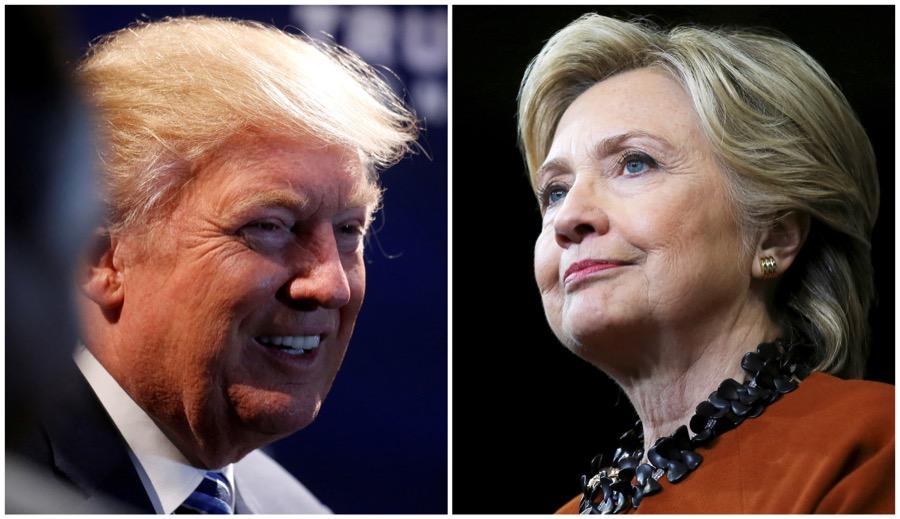Arab countries are underwhelmed by Clinton, but most prefer her to Trump
A combination photo of Republican presidential nominee Donald Trump, at a campaign event in Charlotte, North Carolina, on Oct. 26, and Democratic candidate Hillary Clinton, during a campaign rally in Winston-Salem, North Carolina, on Oct. 27.
There is perhaps nowhere in the world that has been more radically affected by recent decades of United States foreign policy than the Middle East.
Especially since the 1990s Gulf War, America’s footprint in the region has been heavy and loud. Today, thousands of US troops are on the ground in Iraq, and a smaller number in Syria, to support local forces fighting the Islamic State.
So it's no surprise that many in the Middle East and North Africa are watching the US presidential election with a close eye.
But what do they think? Who do they want to win?
Americans don’t have to rely solely on what a single taxi driver tells a journalist to sum up the attitudes of his entire nation. Thankfully there is public opinion research. And despite challenging environments for polling, there’s a wealth of information today about what citizens in these regions think.
It’s Clinton, and it’s not even close
Two major surveys of Arab public opinion carried out last month show a pretty clear majority in favor of Hillary Clinton over Donald Trump.
A survey of more than 3,000 people across 18 countries, carried out by the Saudi newspaper Arab News together with the British polling firm YouGov, found that among those who would vote if they could, 44 percent would go for Clinton, and 9 percent for Trump. (Why that doesn’t add up to anywhere near 100, explained in just a moment.)
A separate poll of eight “leading Arab nations” — Algeria, Egypt, Iraq, Kuwait, Morocco, the Palestinian territories, Saudi Arabia and Tunisia — by the Arab Center in Washington found that Clinton was preferred by 66 percent, while Trump scored 11 percent. The pollsters spoke to 400 adults in each country.
That survey found a high level of interest in the 2016 US race in those countries: “About 60 percent follow the US presidential race on a regular or occasional basis,” the report said.
But one of the most striking figures to come out of the YouGov survey is that some 47 percent would not vote for either candidate (leaving only 53 percent of people polled who chose Clinton or Trump). That’s hardly a ringing endorsement.
Two things — closely linked — might help to explain the enthusiasm gap.
The first is that a whopping 67 percent of people polled in 18 countries held a negative or somewhat negative attitude toward US policy in the region, according to the Arab Center survey. The second is that only a third thought the election would change US policy toward the Arab world.
Comparing the candidates, 55 percent of those surveyed by the Arab Center said Clinton would have the most positive impact on the region, with 14 percent saying Trump would.
So although Clinton is the preferred candidate, most think that a negative US approach to the region would continue regardless.
What’s their problem?
If the negative view of US policy in the region comes as a shock, a closer look at some of the answers might explain why.
The most important concern for respondents in the survey — the issue that they said the US should focus on above all others — was that the next president “should not intervene in the affairs of Arab countries.”
It may seem a slight contradiction that the second-place issue was “combating the Islamic State.” But those two statements seem at odds only if one ignores the primary causes for the rise of ISIS. The 2003 Iraq War and its aftermath were a key factor in the group’s growth, and that is something both Iraqis and Syrians agree on.
The message seems to be that the US helped cause the mess, so they should help clean it up.
But even support for the fight against ISIS only goes so far. Forty-six percent of respondents in the YouGov survey favored the US putting boots on the ground in Syria to fight ISIS, while 54 percent were against the move.
The bright spots
It’s not all doom and gloom for the candidates in the region. Tunisia was an example of where Clinton’s spell as secretary of state gave her a boost. Sixty-five percent of Tunisians surveyed have a positive view of Clinton, according to the Arab Center poll.
And, when the candidates’ names were withheld, Trump’s ideas on abortion and security scored well in the YouGov survey.
Read more: Why some Egyptians may support Trump in the US election
There’s also some good news for Americans. Some 72 percent of those polled by the Arab Center held positive views of the American people. Kuwaitis and Jordanians top that list, with 82 percent of respondents from both countries having a positive view.
So while people in these regions hold a dim view of US leaders and policy, it appears they don’t lay all the blame on voters.
